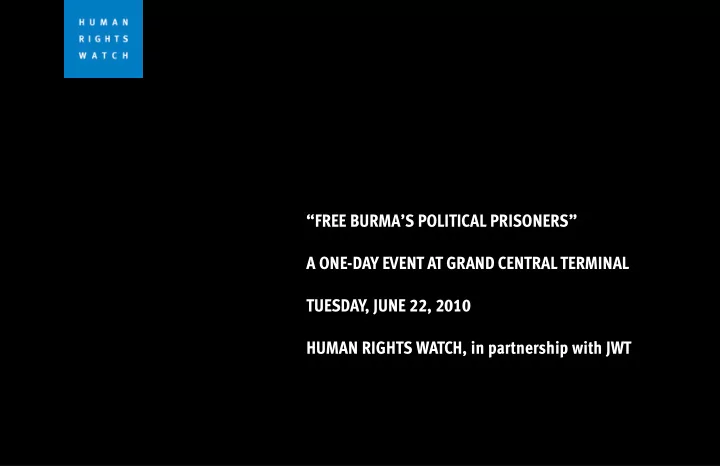

“FREE BURMA’S POLITICAL PRISONERS” A ONE-DAY EVENT AT GRAND CENTRAL TERMINAL TUESDAY, JUNE 22, 2010 HUMAN RIGHTS WATCH, in partnership with JWT
BACKGROUND government as a legitimate member of the international Burma remains one of the most repressive countries community. These elections will be meaningless as long in the world. Activists and anyone outspoken against as members of the political opposition and activists military rule have been routinely locked up in Burma’s remain locked up. prisons for years. More than 2,100 political prisoners suffer in Burma’s squalid prisons. In the lead-up to the 2010 elections, now is the time to call for the release of all political prisoners in Burma. These prisoners include members of the political As part of its “2100 in 2010” campaign to free Burma’s opposition, human rights defenders, artists, journalists, estimated 2,100 political prisoners, Human Rights Watch internet bloggers, labor activists, and Buddhist monks has partnered with advertising agency JWT to organize and nuns. They include courageous protesters who took a special one-day event in Grand Central Terminal on to the streets in August and September 2007, and June 22. individuals who criticized the government for its poor response to Cyclone Nargis in May 2008. The event’s centerpiece will be an interactive installation which will enable visitors to sign a petition on behalf of Military abuses continue with the use of child soldiers, Burma’s political prisoners, to be sent to Burma’s military attacks on ethnic minorities, and forced labor. Each year, leader as well as the United Nations and numerous hundreds of thousands of Burmese become refugees. governments with close ties to Burma. The media coverage around this event will help shine a spotlight on Led by a shadowy clique of generals, Burma has been Burma prior to the election. under military rule since 1962.The military government has announced that it will hold the first elections in 20 years in 2010. The generals hope that the rest of the world will accept a sham electoral process and treat the
CONCEPT On June 22, commuters and tourists at Vanderbilt Hall in New York Grand Central Terminal will be invited to view a giant installation consisting of hundreds of prison cells. In contrast with the busy surroundings, the emptiness in the massive space creates a sense of peace and tranquility. This reflects the peaceful acts that people are imprisoned for in Burma. In solidarity, exiled Burmese monks from around the eastern United States will attend this event and express their support for the monks and other political prisoners currently languishing in Burma’s jails.
A closer look at the display not only reveals photos of Burmese political prisoners inside the cells (e.g. U Ohn Than, Su Su Nway, Zargana and Nay Phone Latt), but also that the prison bars are actually thousands of pens. As the pens are removed, so are the bars of the cells.
THE POWER TO FREE BURMA’S POLITICAL PRISONERS IS IN YOUR HANDS. www.hrw.org/free-burmas-prisoners The pens symbolize Human Rights Watch’s methodology (Investigate – Expose – Change), while directly enabling visitors to signing the petition on behalf of Burma’s political prisoners. Visitors are encouraged to keep the pens, which feature the address of Human Rights Watch’s “2100 in 2010” campaign website: http://www.hrw.org/free-burmas-prisoners
By the end of day on June 22, the book featuring the petition to free Burma’s political prisoners will hold many thousands of signatures. We will send this book to Burma’s military leader General Than Shwe, and mail copies of the petition to the United Nations Secretary-General as well as the leaders of donor countries which maintain close ties to Burma. P E T I T I O N T O F R E E B U R M A’ S P O L I T I CA L P R I S O N E R S
Burma will hold its first elections in 20 years in 2010. But these elections will be meaningless if more than 2,100 political prisoners including members of the political opposition, human rights defenders, labor activists, artists, journalists, and Buddhist monks and nuns, remain locked up in Burma’s squalid prisons. Now is the time to press Burma’s military government to release all political prisoners. Please sign this petition and make your voice heard. Your support can help the people of Burma. MESSAGE BOARD
PLATON Top photographer Platon accompanied Human Rights Watch on a trip to the Thai-Burma border in May 2010. He photographed members of Burma’s exile community, including three monks who helped lead the peaceful “Saffron Revolution” in 2007. The portrait of these three monks will be prominently displayed in Vanderbilt Hall on June 22.
Recommend
More recommend